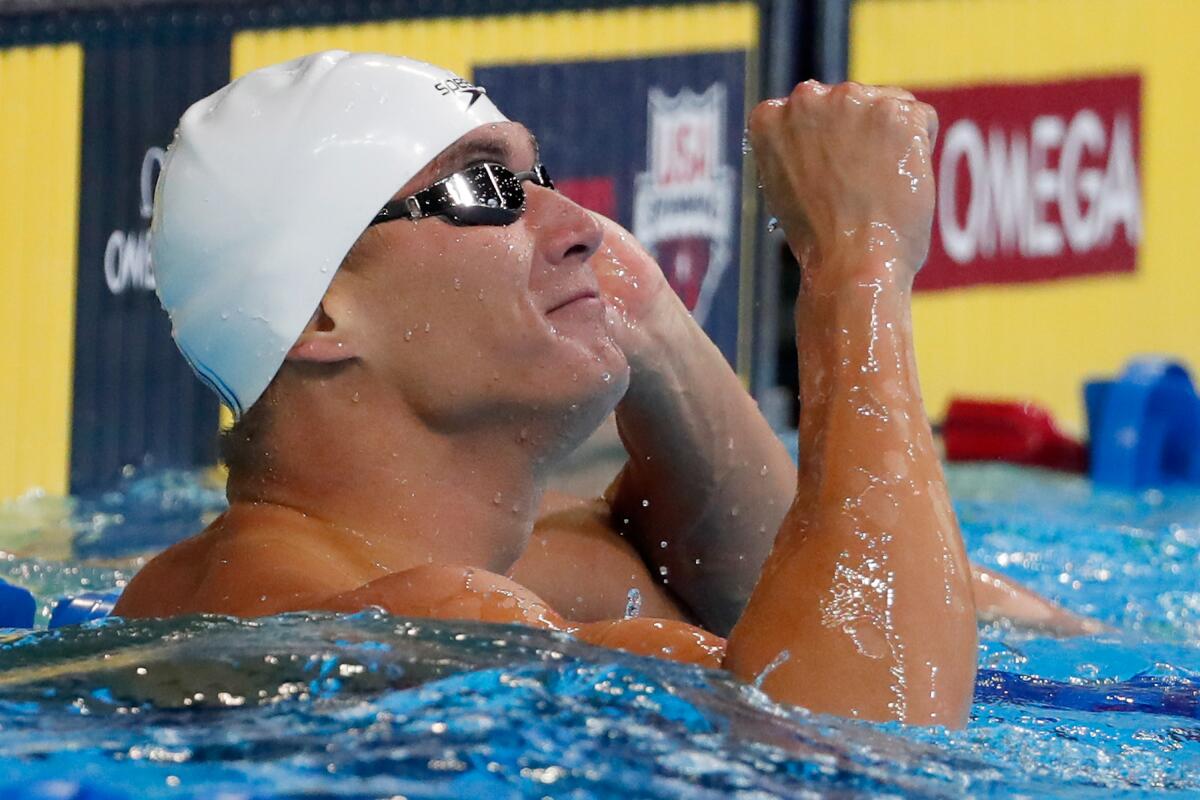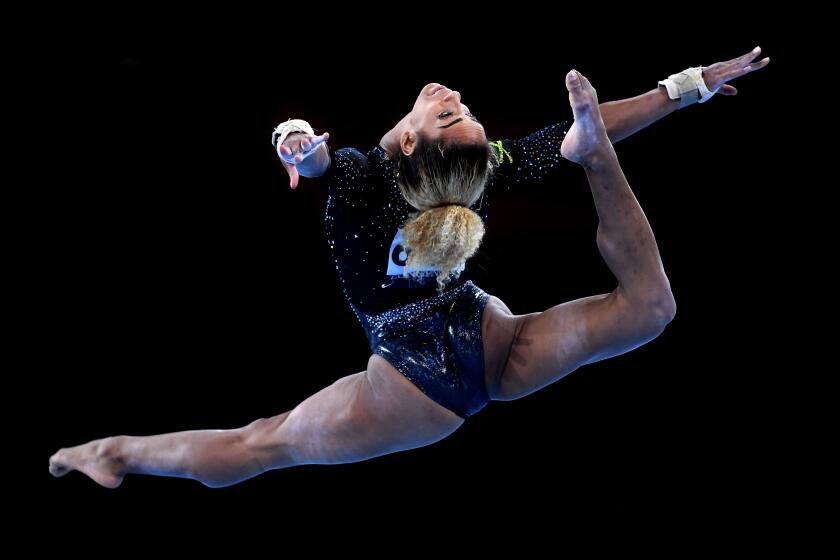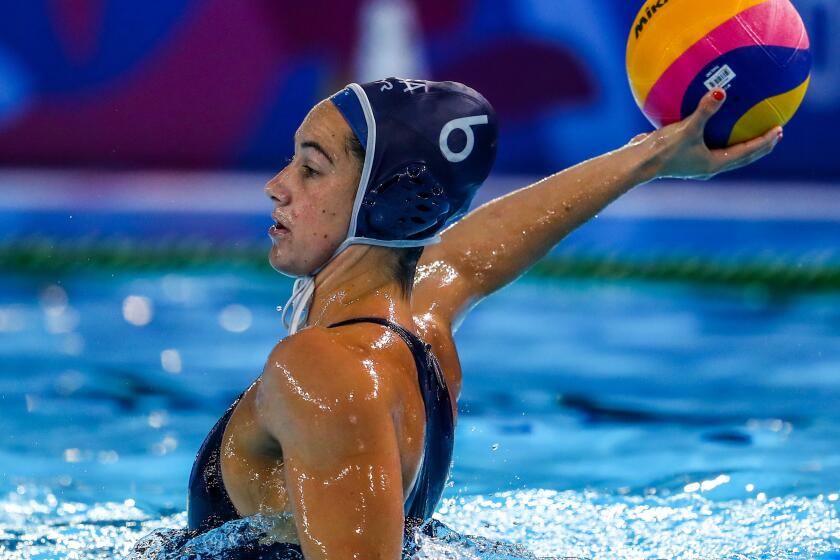Olympics postponement means ‘the athletes’ voices were heard,’ says U.S. swimmer Nathan Adrian

- Share via
To U.S. swimmer Nathan Adrian, the math was simple.
Too many people were getting sick. Too many hospitals were running short on supplies. Too many athletes faced too many unknowns.
The Olympics, he believed, had to be postponed. On Tuesday, the International Olympic Committee agreed.
Amid the COVID-19 pandemic, the 2020 Tokyo Games have been delayed until 2021, a move governing bodies, federations and even Olympic veterans such as Adrian, a five-time gold medalist, came to see as the event’s only choice.
“It feels good that the athletes’ voices were heard,” Adrian said Tuesday, hours after waking up to the news on his phone at 5 a.m. “In my opinion, it would be tragic to hold the Olympics given the circumstances.”
Adrian, 31, had every reason to want the opposite outcome. After beating testicular cancer last year, he fast-tracked a training regimen that forced him to begin almost from scratch. In recent weeks, he finally felt as if he was rediscovering his world-class form, hitting his stride just in time for the upcoming U.S. swimming trials.
Former UCLA gymnast Danusia Francis is looking forward to “another year to get stronger, another year to get more confidence” amid the Olympics postponement.
His cancer could come back at any moment too, turning any delay in the Games into a potentially tortuous personal waiting game to see whether his health will hold up.
Yet when USA Swimming asked last week for the Games to be postponed, Adrian was in support. Because for all the Olympics has given him — he won a gold medal in the 100-meter freestyle in 2012 and has four golds as part of relay teams — taking the Games away, in the short term at least, seemed like the best way to protect the most people.
“Given our probabilities as a society right now and all the information that we know right now, there is a right thing to do,” he said. “It is to stay inside and it is to limit exposure and try to do our best to support those on the front lines, our doctors and nurses and medical assistants.”
Adrian’s perspective is different from most athletes.
The University of California graduate studied public health in college, which didn’t make him an epidemiology expert but did provide him with perspective on pandemics that the rest of the world is only now realizing.
“The most effective public health interventions happen at the government level,” he said, citing the effectiveness of seat belt laws and indoor smoking bans. He thinks the same applies to the coronavirus outbreak, a disease that might be defeated only through drastic and decisive action at the institutional level.
“I am cognizant of the fact that public health and their interventions occasionally can be perceived to impinge on freedom,” he said. “There’s no doubt about that. But in a situation like this, the public health wins for me. Over and over.”
His battle with cancer also broadened his scope.
After announcing his diagnosis in January 2019, Adrian was unsure whether he’d ever compete in the Olympics again. Removing the disease required two surgeries and a recovery process that cost him about 15 pounds and weeks’ worth of training time.
Though his postoperative tests remain clean, “there’s a very real possibility of recurrence,” he said.
“And if there is a recurrence,” he continued, “I would be one of those in the immunocompromised position. Like, I just sent an email to my doctor saying, ‘Hey, if this recurrence happens, should I get COVID-19, get over it, and then start chemo?’ I don’t know, and he probably doesn’t know either. It’s that level of uncertainty.”
It made his athletic goals feel suddenly small, a change of perspective that turned swimming into a tiny speck amid the worrisome bigger picture.
“Like, how am I supposed to think about how I did [in training] today,” Adrian said, “when I’m concerned about how I’m going to get to the grocery store and get my groceries without contracting a disease?”
Adrian then considered the Olympic ideals: “Higher, faster, stronger,” he said. “You have to push your body to achieve that. That is Olympism. That is what we promote.”
But how, he wondered, could that happen in the middle of a global health crisis.
Water polo player Maggie Steffens says she was prepared for the postponement of the Tokyo Olympics, but it was still difficult to digest.
“How are you supposed to tell us, ‘business as usual, find a way to train,’ ” he said, “but make sure that we are cognizant of your health concern?”
It doesn’t mean Adrian, who has eight Olympic medals overall, isn’t feeling conflicted. He had spent the past year regaining his strength and restoring his confidence, a fourth appearance in the Olympics seemingly at his fingertips.
“The last week, I’ve had some of my best practices,” he said, “which is why I have such mixed feelings and sadness regarding the situation.”
But not regret. The Olympics can wait. Like so many other athletes around the world, Adrian didn’t feel as though there was any other choice.
“It’s like when you cash a check, and then you finally see the money in your bank,” he said. “You know it’s happening, it’s coming. You just feel better that you saw it in writing.”
More to Read
Go beyond the scoreboard
Get the latest on L.A.'s teams in the daily Sports Report newsletter.
You may occasionally receive promotional content from the Los Angeles Times.










